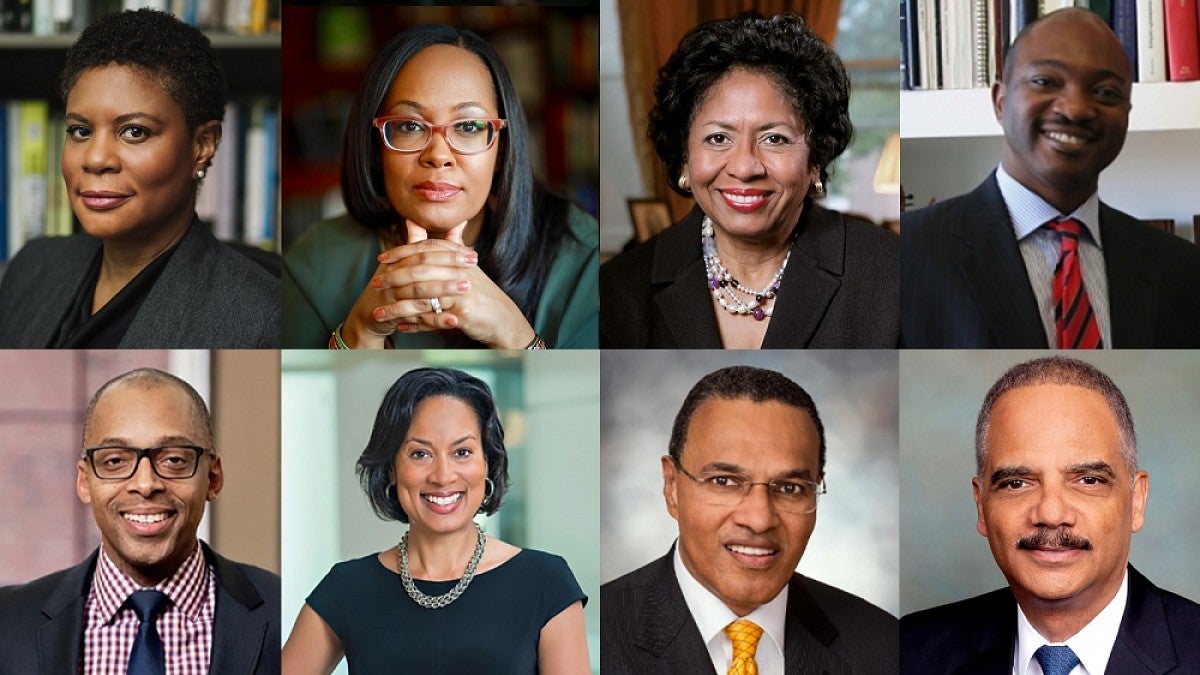Authors, lawyers, sociologists, historians, a former U.S. attorney general and other leading national and international experts will be part of the University of Oregon’s African-American Workshop and Lecture series’ fifth year.
Like many activities, this year’s series will be virtual with offerings throughout the year under the timely theme of “This is My America.” The theme originates from the critically received young adult novel by the same title authored by featured speaker Kimberly Johnson, UO assistant vice provost for advising and director of advising for the Center for Multicultural Academic Excellence. Other speakers hail from across the United States and as far as Ghana.
The series kicks off with two co-sponsored October events, talks by Alondra Nelson and former U.S. Attorney General Eric Holder Jr. The series will join the Wayne Morse Center for Law and Politics 20th anniversary keynote lecture and the Lorwin Lectureship on Civil Rights and Civil Liberties to bring the two speakers to campus.
Alondra Nelson — an award-winning sociologist, Harold F. Linder Chair and professor at the Institute for Advanced Study, and author of “Social Life of DNA: Race, Reparations, and Reconciliation after the Genome” — will speak Oct. 7 from 4 to 5:30 p.m. On Oct. 20 from noon to 1:15 p.m., the Wayne Morse Center with support from the African American Workshop and Lecture Series will host Holder speaking on “Defending Democracy: A Conversation with Eric H. Holder, Jr., 82nd Attorney General of the United States (2009-2015).”
Fall quarter will also include offerings by Ruth Simmons on Nov. 18 and Emmanuel Akyeampong on Dec. 1. Simmons is the first African-American to be named president of an Ivy League school, Brown University, where she established a steering committee on slavery and justice to explore the university’s historical connection with the slave trade. Akyeampong is faculty director of the Harvard University Center for African Studies and professor of history and African and African American Studies at Harvard University.
Winter quarter will bring Khalil Gibran Muhammad, professor of history, race and public policy at the Harvard Kennedy School and the Suzanne Young Murray Professor at the Radcliffe Institute for Advanced Studies, and Kimberly Johnson, author of “This is My America” and UO assistant vice provost for advising and director of advising at the Center for Multicultural Academic Excellence.
In February, the series again joins in supporting the UO School of Law’s Derrick Bell Lecture. This year’s speaker is Lia Epperson, a professor of law and senior asssociate dean for faculty and academic affairs at American University College of Law in Washington, D.C. Her expertise includes civil rights, constitutional law and education policy.
Spring will bring Freeman Hrabowski, president of the University of Maryland, whose research and publications focus on science and math education with a special emphasis on minority participation and performance. In 2012 President Obama appointed him chair of the President’s Advisory Commission on Educational Excellence for African Americans.
An additional offering this year is Black Resilience, a one-credit course fall and winter terms offered by Vice President for Equity and Inclusion Yvette Alex-Assensoh. The course is organized around the African American Workshop and Lecture Series and will draw heavily on the themes explored in the series: racial identity, racial justice, activism among Black youth, the changing nature of Black diasporic relationships, and the role of Blacks in higher education. The course will use readings authored by series speakers as well as other experts.
Alex-Assensoh said the series is one of the demands from the 2015 Black Student Task Force. The series has hosted more than 25 speakers since its inception.
“In our current climate of renewed and continuing calls for racial justice, this year’s series provides an opportunity for faculty, staff, students and friends of the university to educate themselves on these dynamic issues,” Alex-Assensoh said. “The initial BSTF request was based on the idea that education is a mechanism for change, and we are confident that the speakers will share inspirational information that will lead to change on our campus and beyond.”
She also noted that because this year’s series will be hosted online, everyone on campus has an opportunity to participate and to invite others to join in as well. Faculty members are asked to encourage participation among students.
For more information on the series, see the African-American Workshop and Lecture series page on the DEI website.
—By tova stabin, University Communications


